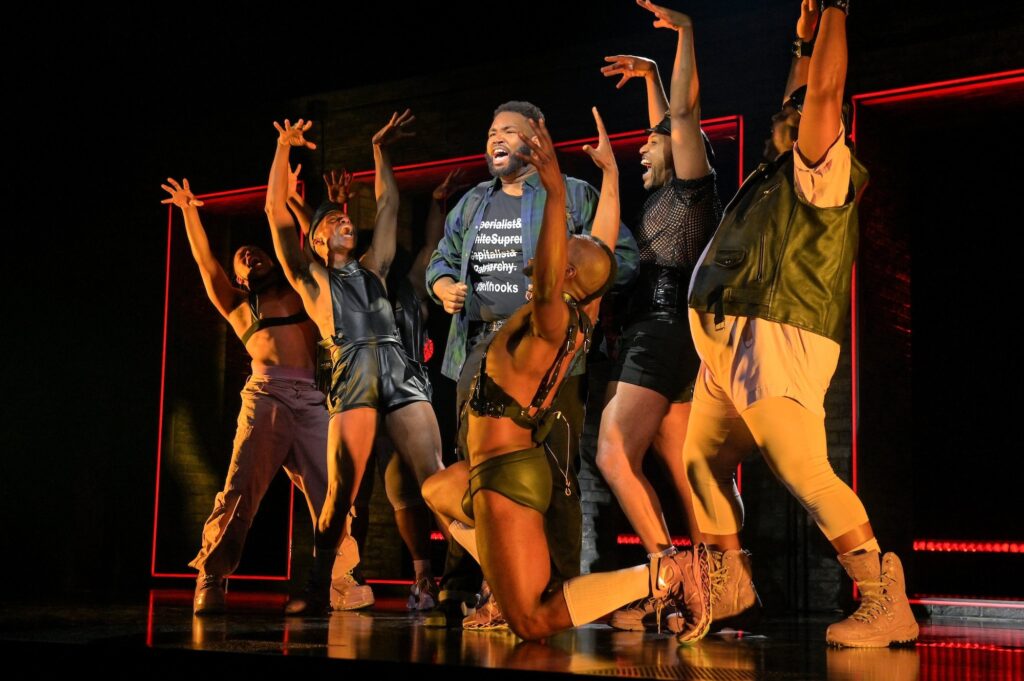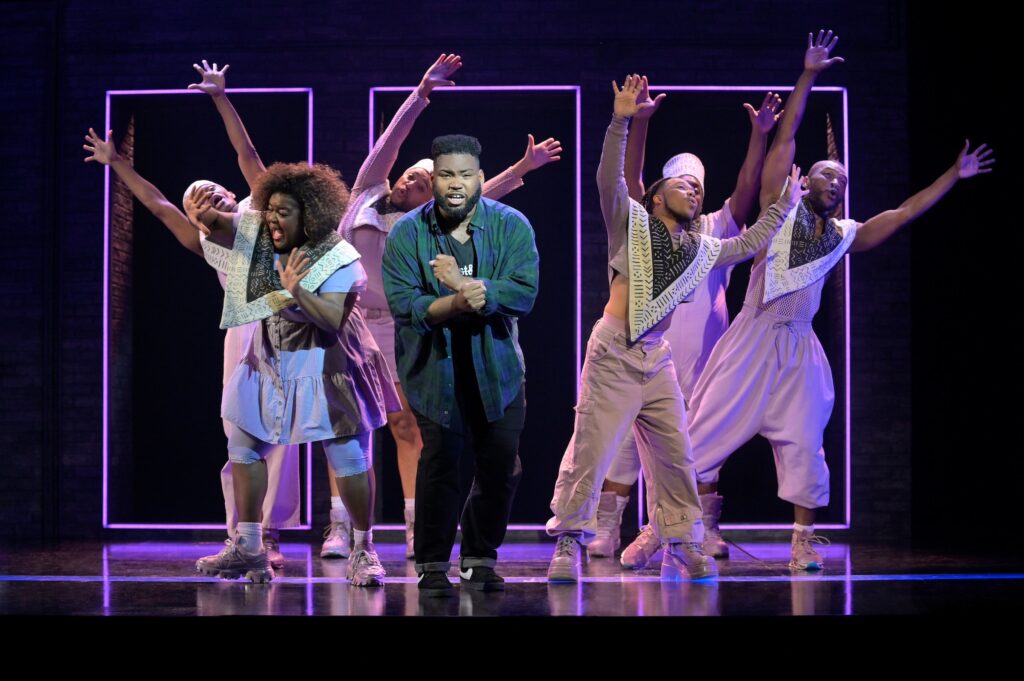Genre is a double-edged sword, as restrictive as it is necessary. It’s a great indicator of what an audience can expect, yet it’s limited in describing a story’s complexity. Since the days of Greek theatre being limited to Tragedy and Comedy, dramatists and storytellers have done their best to free themselves of the confines of genre. One could even say that artists were trying to break free of the stereotypes of genre.
Michael R. Jackson’s Tony-sweeping A Strange Loop (West Coast premiere through May 12 at ACT’s Toni Rembe Theater, SF) is a play that merges genres in an attempt to subvert stereotypes. It’s certainly a musical, a “race play,” and roman à clef. It sells itself as a satire. What it doesn’t tell you—and anyone going in should be given every trigger warning available—is that it’s also a tasteless exercise in masochistic torture porn, in which racial brutality and sexual assault are used for cheap shock value. Not since The Passion of the Christ have I seen a piece that took such unrepentant glee in the trauma of its lead.
Jackson’s self-insert lead is named Usher (Malachi McCaskill), presumably due to the position he works at the Broadway theatre hosting The Lion King. A Black man in his mid-20s, Usher’s an NYU student who, like many aspiring artists before him, moved to The Big Apple to make his living as a creator. This is of little concern to his family, who see no future in the arts—unless he writes gospel plays like Tyler Perry. If that weren’t enough, Usher, whose musical tastes lean more towards early-Lilith Fair, is constantly struggling with his Blackness, as his “inner-white girl” dictates most of his preferences. This all comes to a head when a bad hook-up from a queer dating app goes horribly wrong.

As both a critic of the arts and someone “of a certain age,” I’m the sort of person who goes into a work knowing full well that a story may draw from dozens (if not hundreds) of sources that preceded it. The trick is to see what the new version adds to the tropes and archetypes, or at least has to say about them. A Strange Loop is a stew of many ingredients: the meta-theatricality and disdain for gospel plays from The Colored Museum; the (also meta-theatrical) “young-Black-man-on-a-journey” musical mold of Passing Strange; the endless bloviating that turns characters into statements rather than people, not unlike Branden Jacobs-Jenkins’s work. Even the use of an all-Black ensemble (John-Andrew Morrison, Jordan Barbour, J. Cameron Barnett, Avionce Hoyles, Tarra Conner Jones, and late-addition Carlis Shane Clark) to play Usher’s ever-intrusive Thoughts harkens back to both Passing Strange and the Greek chorus of old.
But Jackson never does anything to distinguish his piece from those that came before. His character is a playwright who kvetches about the stereotyping of Black characters, yet Usher is surrounded by nothing by stereotypes. Whereas a playwright like Celine Song would peel away the layers to reveal the person beneath, Jackson wants us to know that Usher looks at the world with a crooked eye, nothing more. True, the characters (particularly Usher’s family) wink at the audience to let us know they’re aware of their caricature-ish nature, but the stereotypes are never subverted. It’s just that now there’s a Black artist in charge rather than a white one (unless you count director Stephen Brackett). It’s the lazy Family Guy excuse of “if we acknowledge it’s racist, that makes it OK to be racist”. And when the script does have the opportunity to comment on Black stereotype-enablers like Tyler Perry, nothing new is said, so the commentary sounds a decade-and-a-half out-of-date.
I found myself reminded of Spike Lee’s Bamboozled; not just the film proper, but also Boondocks creator Aaron McGruder’s infamous takedown of the film on the messageboards of OkayPlayer. McGruder despised Lee’s toothless, out-of-date “satire”, as well as the way it eventually abandoned its flimsy story threads for shock-value violence at its climax. So, too, does A Strange Loop have a flimsy storyline that’s abandoned (Usher is hired to ghost-write for Tyler Perry) in favor of the bad Grindr date that leads to the play’s infamous rape scene with a racist whiteboi who fetishizes Black men. It’s not something borne out of the themes established in the play, it’s akin to shouting incoherently so that people won’t realize you have nothing of substance to say. It’s as offensive as it is uncreative.

Which is a shame, because there is value to be found in the production. Jackson’s songs (which he wrote and composed himself) are catchy, the cast (Tarra Conner Jones, in particular) is talented, and production design is of the high standard one would always expect from ACT. A late-in-the-play number, illustrating the gross conservative idea that “AIDS is God’s punishment” is brilliant to the point that the rest of the show can’t help but pale by comparison. It’s the point where show finally succeeds in achieving the biting, Afrocentric satire for which it strived all along. But this is the only time it reaches this goal, making the sequence an anomaly rather than a fitting piece to the puzzle.
I attended the nearly full opening night show happy to see, by my perception, more masks than the last time I attended an ACT show (which, incidentally, was also for a Black show that put more energy into garish aesthetics than gripping storytelling). For a crowd that size in a building of that age, my Aranet4’s CO² readings peaked around 1273ppm by the end of the 90-100min. show.
A Strange Loop is a show that jumps through multiple genres in an attempt to present its lead as someone who defies description. A noble idea, but the actual result spends most of its time treading well-worn territory before devolving into pure exploitation. Given my own precarious job and housing predicament, I honestly hope this isn’t the last show I ever see at ACT, because this is the worst show of the year thus far.
A STRANGE LOOP’s West Coast premiere runs through the 12 of May at ACT’s Toni Rembe Theater, SF. Tickets and further info here.







